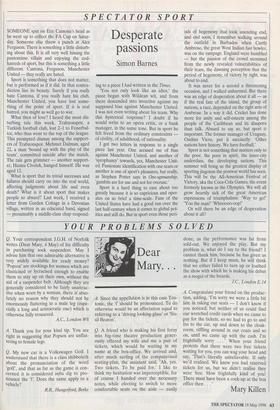SPECTATOR SPORT
Desperate passions
Simon Barnes
SOMEONE spat on Eric Cantona's head as he went up to collect the FA Cup on Satur- day. Someone else threw a punch at Alex Ferguson. There is something a little disturb- ing about this. It is all very well hissing the pantomime villain and enjoying the cod- hatreds of sport, but this is something a little different. Cantona, Ferguson, Manchester United — they really are hated.
Sport is something that does not matter, but is performed as if it did. In that contra- diction lies its beauty. Surely if you really hate Cantona, if you really hate his club, Manchester United, you have lost some- thing of the point of sport. If it is real hatred, you might as well go to war.
What then of love? I heard the most dis- turbing tale this week. Trabzonspor, a Turkish football club, lost 2-1 to Fenerbal- ice, who thus went to the top of the league. This prompted dismay among the support- ers of Trabzonspor. Mehmet Dalman, aged 22, a man 'bound up with the play of the team', committed suicide after the match. The tale gets grimmer — another support- er, Husnu Civelek, hanged himself. He was aged 12.
What is sport that its trivial successes and failures should carry on into the real world, affecting judgments about life and even death? What is it about sport that makes people so absurd? Last week, I received a letter from Garden Cottage in a Devonian village, written in an educated hand, signed — presumably a middle-class chap respond- ing to a piece I had written in the Times.
`You not only look like an idiot,' the piece began with Wildean wit, and from there descended into invective against my supposed bias against Manchester United. I was not even writing about his team. Why this hysterical response? I doubt if he would write to an opera critic, or a bank manager, in the same tone. But in sport he felt freed from the ordinary constraints of civility, of adulthood, of rationality. I got two letters in response to a single piece last year. One accused me of bias against Manchester United, and another of `sycophancy' towards, yes, Manchester Unit- ed. Passionate identification with one team or another is one of sport's pleasures, but really, as Stephen Potter says in One-upmanship, `gambits are for use and not for overuse.'
Sport is a hard thing to care about too greatly because it is so capricious and oper- ates on so brief a time-scale. Fans of the United States have had a good run over the last half-century when it comes to global pol- itics and still do. But in sport even those peri- ods of hegemony that look unending end, and end soon. I remember walking around the outfield in Barbados when Curtly Ambrose, the great West Indian fast bowler, was on the rampage. England were humbled — but the passion of the crowd stemmed from the newly revealed vulnerabilities of their team, the dawning perception that the period of hegemony, of victory by right, was about to end.
It was never for a second a threatening occasion, and I walked unharmed. But there was an edge of desperation about it all — as if the real fate of the island, the group of nations, a race, depended on the right arm of Ambrose. In a way it did. Cricket has done more for unity and self-esteem among the people of the Caribbean and its diaspora than talk. Absurd to say so, but sport is important. The former manager of Uruguay, Ondina Viera, put it succinctly: 'Other nations have history. We have football.'
Sport is not something that matters only to the poor, the poor in spirit, the inner-city underclass, the developing nations. This summer will bring us the greatest display of sporting jingoism the postwar world has seen. This will be the All-American Festival of Victory, aka the Coca-Cola Games, the event formerly known as the Olympics. We will all grow heartily sick of the great American expressions of triumphalism: Way to go!' `You the man!' Wh00000-oop!'
Or will there be an edge of desperation about it all?


































































 Previous page
Previous page